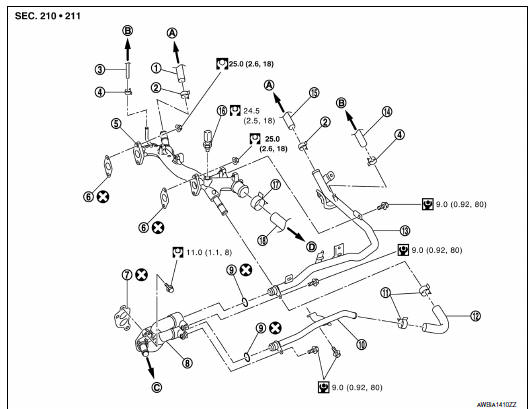Nissan Maxima Service and Repair Manual: Water outlet and water piping
Removal and Installation

- Heater hose
- Clamp
- Water hose
- Clamp
- Water outlet
- Gasket
- Gasket
- Water connector
- O-ring
- Water bypass pipe
- Clamp
- Water hose
- Heater pipe
- Water hose
- Heater hose
- Engine coolant temperature sensor
- Clamp
- Radiator hose (upper)
- To heater core
- To electric throttle control actuator
- To oil cooler
- To radiator
WARNING: Do not remove the radiator cap when the engine is hot. Serious burns could occur from high pressure engine coolant escaping from the radiator. Wrap a thick cloth around the radiator cap. Slowly turn it a quarter of a turn to release built-up pressure. Carefully remove radiator cap by turning it all the way.
NOTE: When removing components such as hoses, tubes/lines, etc., cap or plug openings to prevent fluid from spilling.
REMOVAL
CAUTION: Perform when the engine is cold.
- Partially drain coolant from radiator. Refer to CO-11, "Changing Engine Coolant".
- Remove engine room cover. Refer to EM-23, "Removal and Installation"
- Remove front air duct and air cleaner case assembly. Refer to EM-24, "Removal and Installation".
- Disconnect electric throttle control actuator coolant hoses.
- Remove radiator hose (upper) and both heater hoses.
- Remove connector(s) from heater pipe.
- Remove engine coolant temperature sensor on water outlet.
- Remove water outlet, heater pipe, water connector, and water bypass pipe nuts and bolts
INSTALLATION
- Installation is in the reverse order of removal.
- Securely insert each hose, and install a clamp at a position where
it does not interfere with the pipe
bulge.
CAUTION: Do not reuse gasket. - When inserting heater pipe and water bypass pipe into water
connector, apply neutral detergent to new
O-rings.
CAUTION: Do not reuse O-rings. - After installation refill engine coolant and check for leaks. Refer to CO-11, "Changing Engine Coolant" and CO-10, "System Inspection".
 Thermostat and thermostat housing
Thermostat and thermostat housing
Removal and Installation
Gasket
Thermostat assembly (water inlet)
WARNING:
Do not remove the radiator cap when the engine is hot. Serious burns could occur
from high pressure
engine ...
 Unit disassembly and assembly
Unit disassembly and assembly
COOLING FAN
Disassembly and Assembly of Cooling Fan
Fan blade
Fan shroud
Fan motor
DISASSEMBLY
Remove fan blade nut.
Remove fan blade from fan motor.
Remove fan motor bolts a ...
Other materials:
BCM (body control module)
Reference Value
NOTE:
The Signal Tech II Tool (J-50190) can be used to perform the following
functions. Refer to the Signal Tech II
User Guide for additional information.
Activate and display TPMS transmitter IDs
Display tire pressure reported by the TPMS transmitter
Read TPMS DTCs
...
Tire Pressure Monitoring System
(TPMS)
WARNING
Radio waves could adversely affect
electric medical equipment. Those
who use a pacemaker should contact
the electric medical equipment
manufacturer for the possible influences
before use.
This vehicle is equipped with the Tire
Pressure Monitoring System (TPMS). It
monitors tire pres ...
IPDM E/R (intelligent power distribution module engine room)
Reference Value
VALUES ON THE DIAGNOSIS TOOL
TERMINAL LAYOUT
PHYSICAL VALUES
Fail Safe
CAN COMMUNICATION CONTROL
When CAN communication with ECM and BCM is impossible, IPDM E/R performs
fail-safe control. After CAN communication recovers normally, it also returns
to nor ...
Nissan Maxima Owners Manual
- Illustrated table of contents
- Safety-Seats, seat belts and supplemental restraint system
- Instruments and controls
- Pre-driving checks and adjustments
- Monitor, climate, audio, phone and voice recognition systems
- Starting and driving
- In case of emergency
- Appearance and care
- Do-it-yourself
- Maintenance and schedules
- Technical and consumer information
Nissan Maxima Service and Repair Manual
0.0062
